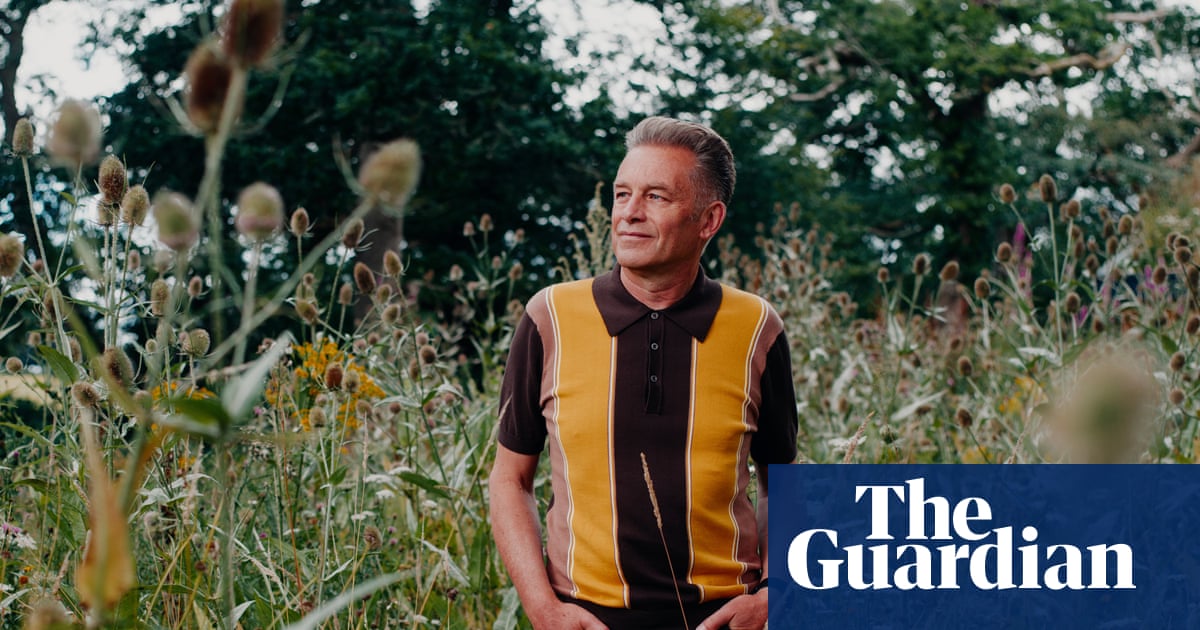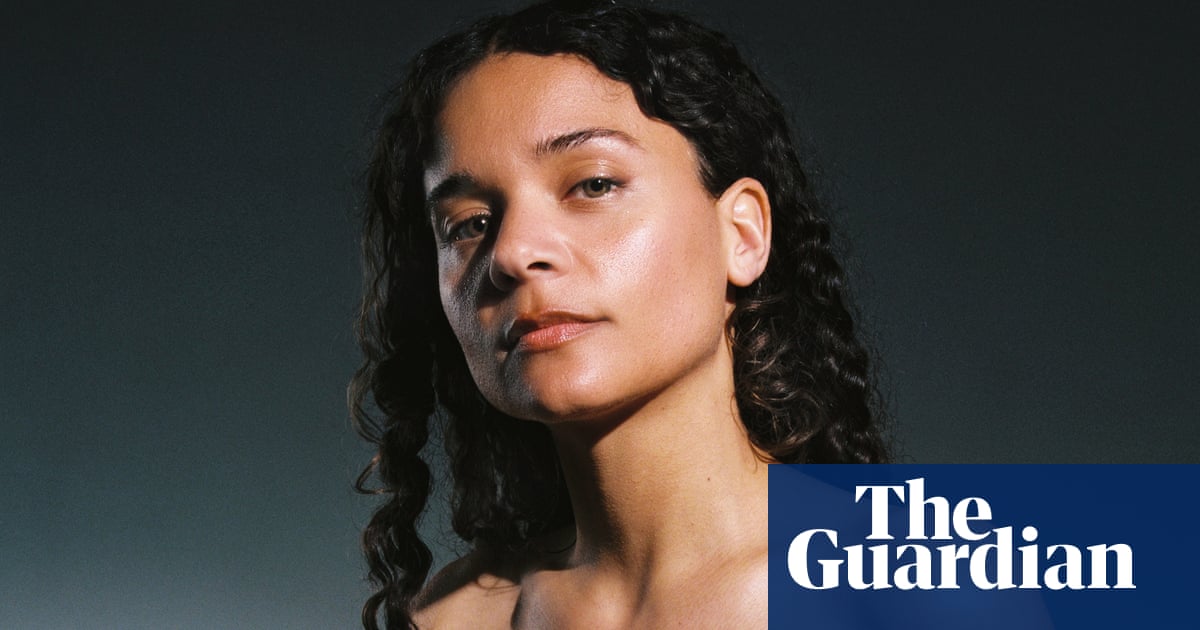
n July last year, Nikesh Shukla tweeted a photograph of 11 books, captioned: “This is a decade’s worth of work.” At the top was his debut novel Coconut Unlimited, and at the bottom his latest book, Brown Baby: A Memoir of Race, Family and Home. It was supposed to come out in June, but the pandemic pushed it back, by which time – everyone supposed – bookshops would reopen and live events would return. Instead, we are back in lockdown and Shukla and I are peering at one another down the barrels of our laptop cameras to discuss Brown Baby.
The book’s title comes from the beautifully sober 1960s ballad by Oscar Brown Jr, expressing hopes to his son (“When out of men’s hearts all hate is hurled / You’re gonna live in a better world”) and Shukla’s Brown Baby is addressed to his own two daughters, who are now six and three years old. “I love the tradition of writers writing letters to their children,” he says. “James Baldwin writing to his nephew [“My Dungeon Shook” in The Fire Next Time], Ta-Nehisi Coates [in Between the World and Me]. I didn’t want it to be an overly intellectualised book about race and all the other things. I wanted it to be someone not quite having the answers, manoeuvring in that way that when you’re a parent, your opinions on things change all the time.”
What Shukla shares with his daughters, and the reader, in Brown Baby is sometimes funny, often moving and regularly upsetting. His accounts of racism and abuse, from being called “shit-skin” to an abusive email naming his daughters (“how did they know your names?”), are hard to read. “This book had to be about the stuff that keeps me up at night,” he says.
As well as race and reflections on parenting (“Nobody,” he points out, “ever says it’s going to be really boring!”), one of the most striking elements of Brown Baby is the open discussion of Shukla’s relationship with food – compulsive snacking, comfort eating – which is unusual and refreshing to read from a man. “Part of me really just wants to bleed on the page. If I’m writing for my daughters, I want them to know who I am.” The book shows Shukla lying to his wife (and his calorie counter app) about snacks at home, snacks at work, snacks on the way to the shop to buy more snacks. “I eat my feelings,” he says, “and immediately feel completely ashamed. And I knew if I put that out there I wouldn’t be alone.”
But this chapter also grows into an affecting exploration of food and memory, communing with the person who features most prominently in the book, as both a presence and an absence: Shukla’s mother, who died in October 2010 at the age of 59 (“She turned 59 in the hospital, I remember taking her a cake”). In Brown Baby he tries to recreate her recipes, is transported by nostalgic smells when cooking the last meals she left in the freezer: “Some bhajias. And another container, this one has sweetcorn kadhi in it … The smell is so soothing. I can practically feel the coarseness of a cumin seed between my front two teeth. I don’t know what to do. There I am, in her kitchen, holding her food, clutching it like a second chance.” And reflects on how eating to assuage his grief means “my stomach may feel full but something else in me is empty”.
His mother’s death coincided with the launch of Shukla’s career as a writer: she died 10 days before his debut novel came out. “I had this really strange time where I had this thing that I’d wanted to happen my entire life, but at the same time, one of the worst things that could possibly have happened was unfolding.” And some of the publicity ahead of the novel led to an argument with his mother, which turned out to be the last time they would speak. “Everything I do is almost to seek forgiveness for upsetting her.”
Did writing about it help him grieve? “I wrote the first draft really quickly and then realised my grief wasn’t complete, I’d put it on hold to be there for my dad. Editing the book I suddenly felt I was confronted by the ghost of my mum again. When I handed over the book it felt I’d finally had that moment to say goodbye.”
Brown Baby enabled closure in more ways than one. “It was my 10th year of being a published author. I had this body of work that felt very circular, starting with a fictionalised account of my teenage years [Coconut Unlimited], and ending with where I am now. It was really exciting for me to feel I’d completed something and could free myself for what I wanted to do next.”
Thinking about what to do next seems characteristic of Shukla’s busy and multifaceted approach to his work: he is a central figure in the wider British literary culture, having done a great deal to highlight diversity in publishing. (This is an apt accolade for a writer whose first book was rejected by an agent who “didn’t feel my characters were authentically Asian”.)
Shukla has written novels, screenplays and political commentary on social issues; he has worked as an educator, talking to schools about masculinity in connection with his young adult novel The Boxer; he has co-established the Jhalak prize for writers of colour and a literary agency. He’s a fellow of the Royal Society of Literature and has been awarded honorary doctorates from Roehampton University and Bath University (“the stuff my dad can tangibly see!”).
In 2015 he edited the groundbreaking anthology The Good Immigrant (published the following year) on race in Britain, featuring names who have since become famous, including Reni Eddo-Lodge, Nish Kumar, Riz Ahmed and Musa Okwonga. Is he remarkably prescient at talent-spotting, I wonder? “Definitely not,” he says firmly. “Most of the people in that book are my peers. I was doing gigs with Salena Godden and Inua Ellams and Musa. Riz I’ve known since school. Salena was one of my first ever mentors.”
In fact mentoring new writers, as he had been mentored by Godden, is another way Shukla has paid his success forward. “I take on 10 writers every six months; four weeks of intensive, weekly sessions about the book they’re working on, then four monthly sessions where we check in, I read the work and give feedback on it.” But he realised recently that “I can’t do this by myself, so I did sessions to train different writers to become mentors”.
What energy, I wonder, drives the impressive scope and scale of his interests? Would Shukla be happy being “just” a novelist? “I do it because I feel a responsibility. I know I’d be nowhere without the people who took time out to help me. I don’t believe in the writer as the strong, silent type. I believe in community and I’m here because of the community.”
He feels a sense of responsibility too, from his private education: he attended Merchant Taylors’ school in Liverpool, the only child of his family to do so. “I understand that I had that privilege,” he says, “but it’s what you do with it that really counts. My mum and dad really struggled in order to send me there, thinking I’d end up with a job and the networks to make everyone comfortable.” But looking out for others, making a difference, is in his blood. He comes from “an activist family”; his uncle, who in 1968 sued a company that refused to sell a house to “coloureds”, said “they keep telling us the laws are here to protect us. But no one is doing anything to change people’s hearts and minds.” And, Shukla adds: “I thought as a writer I can do something to help shape people’s hearts and minds.”
In Brown Baby he writes about how his mother wanted him to write only as a hobby: “Be comfortable first, don’t struggle like we do.” “Yeah,” he says, “my mum really wanted me to be a lawyer, and I think the thing that cut me up for a while was that she never got to see that I was OK. But I look back at all the stuff that I’ve achieved over the years …” – he pauses, then nods – “I think she would have been proud.”
‘I don’t want you to ever consider yourself white. Is that bad?’
An edited extract from Brown Baby by Nikesh Shukla
I don’t know how to make you proud of your skin colour. I figured it would be something we would talk about later, when you were older and starting to become more shaped by external factors. I didn’t want it to become an issue so early.
Sadly, this is the reality of raising a child of colour in an institutionally racist country, where being white is seen as default. You see it in boardrooms and you see it on screens and you see it in the plasters we use to cover our skin when it tears. When I look at you, I think perhaps you might end up passing for white. I don’t want you to. I don’t want you to ever consider yourself white. Is that bad?
It’ll probably never happen, though. You will be mixed race and you will be brown and no matter how you shape yourself, the moulds society present for you to fit into are fixed and immovable.
I don’t want to have this conversation so early, Ganga. I don’t want for me to make decisions about your identity before you’ve even considered it. I have to manage my feelings and expectations and let you find your own way. But I know, that however you choose to self-identify when you’re older, the world will see you as a person of colour and treat you accordingly.
Once, you told me that you were a mix. You were a bit brown and a bit white. You wanted to be our Venn diagram. You wanted to be the bridge between us. You didn’t want to be more one than the other.
A consistent thing you said throughout your entire childhood was that you didn’t like the colour brown. It was too dark. Another time you told me it was dirty. Recently, you told me you wished I was white.
“Then I will be white,” you said.
“Why?” I replied.
“I want to be like Mummy,” you said before disappearing into another room, as if that was that and there was nothing more to say.
You prefer bright colours, you say. You like pink and red and orange and yellow. The darker colours are not your favourite. You hate brown. Context weighs heavily on situations but so does history. Societal norms pervade in ways we cannot always see. You may be talking about felt tip pens. But you are also talking about the last two hundred years of history. You may be four but you are perpetuating tropes you are yet to even comprehend.
One evening, we’re reading a book together. Mumbi, the doll a friend brought back from Sri Lanka, sits in my lap next to you. You pick Mumbi up and throw her to the floor.
“Why don’t you want her?” I ask. “Do you not like her?”
“I do like her,” you say. “I do. She has a nice smile and she has pretty black hair.”
“And gorgeous brown skin,” I say.
“I don’t want to be brown,” you say, and look at me. You’re trying to work something out, and I don’t know how to help you through it. “I want to be like Mummy.”
“You are brown. And that’s a good thing,” I tell you, before returning to the book.
“Okay,” you sigh, with the air of a teenager whose embarrassing dad has just told them he will drive them to the school dance.
We carry on reading. Your resignation is heavy in my chest.
• Brown Baby: A Memoir of Race, Family and Home is published by Bluebird (£16.99) on 4 February. To order a copy go to guardianbookshop.com. Delivery charges may apply.












